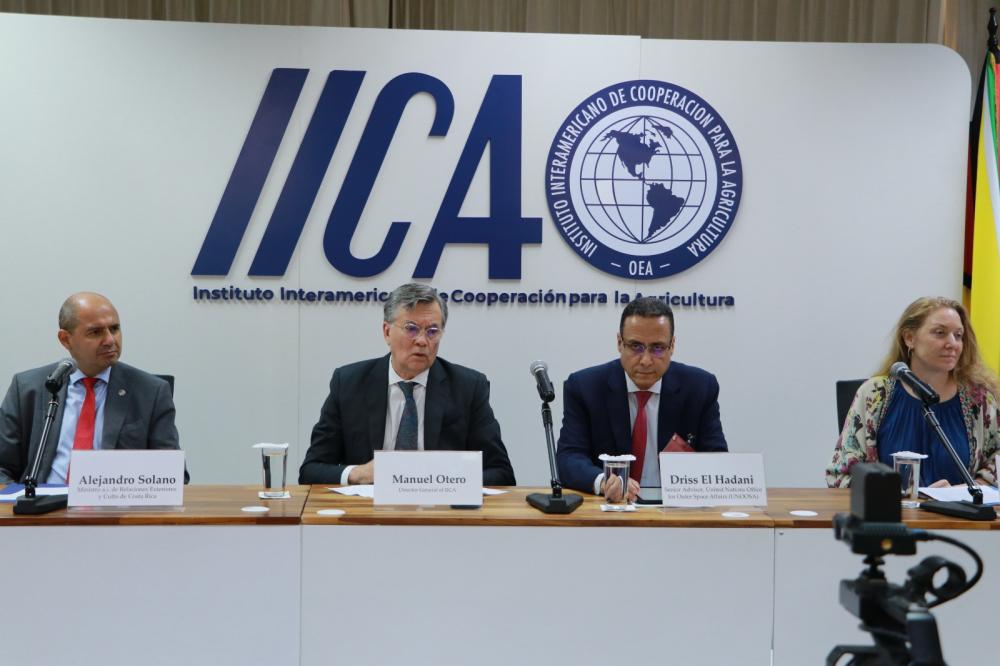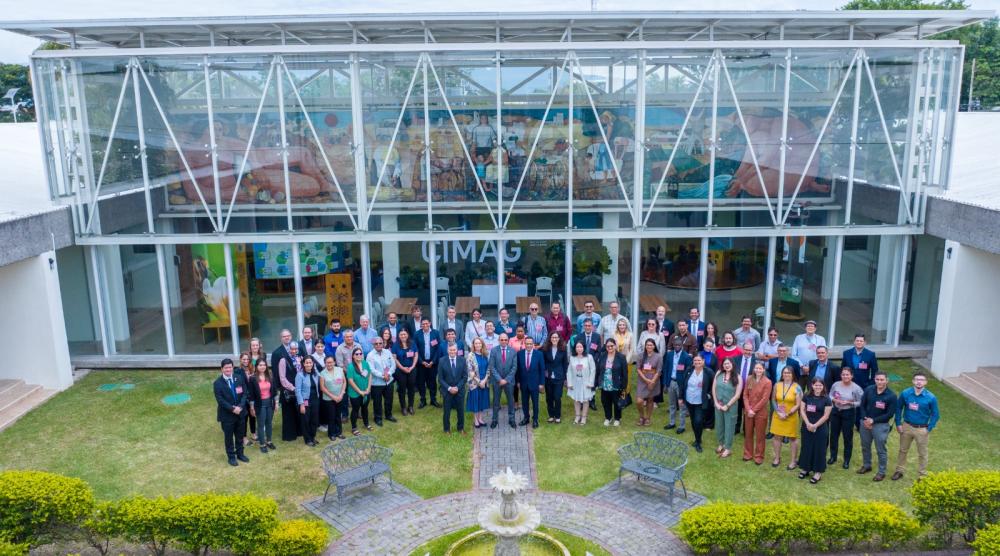Conference organized by UN agency at IICA Headquarters discusses how space technology can reach farmers to contribute to sustainable water management

San José, 7 May 2024 (IICA) – Space technologies are set to play a fundamental role in sustainable water management and it is essential that they be accessible to farmers who produce food in rural areas every day. With these words the Sixth International Conference on the Use of Space Technology for Water Management (Space4Water 2024) began.
For the first time, this four-day conference is being held at the headquarters of the Inter-American Institute for Cooperation on Agriculture (IICA) in San José, with the participation of experts from governments, international organizations and academia from all over the world.
The conference is organized by the United Nations Office for Outer Space Affairs (UNOOSA), an agency of the UN General Assembly that fosters the use of space technologies for countries’ economic development.
Along with the government of Costa Rica, IICA is hosting an event that has the support of the Prince Sultan bin Abdulaziz International Prize for Water (PSIPW), awarded in Saudi Arabia every two years to scientists to highlight their contributions to global water issues.
Participating at the opening ceremony were Ambassador Alejandro Solano, Interim Minister of Foreign Affairs and Worship of Costa Rica; Driss El Hadani, UNOOSA Senior Advisor; Allegra Baiocchi, UN Resident Coordinator in Costa Rica, David Jalajel, on behalf of the Prince Sultan bin Abdulaziz International Prize for Water; and Manuel Otero, IICA Director General.
Space technology for development
UNOOSA works to promote international cooperation in the peaceful use and exploration of space, and in the utilization of space science and technology for sustainable economic and social development. Since space technology enables water quality monitoring, weather forecasting and access to technical knowledge, UNOOSA developed with the PSIPW a water management portal, named Space4Water. Its goal is to strengthen ties between different stakeholders and communities to improve water management through the use of space-based technology.
IICA is part of the Space4Water community through its FabLab, a co-creation space inaugurated by this hemispheric organization in 2019, to search for innovative solutions with technological bases for problems that limit rural agricultural development in the Americas.
In hosting the Sixth International Conference on the Use of Space Technology for Water Management, IICA seeks to solidify its international standing as a leader in climate change issues and water resource management through technology. Holding this conference in Costa Rica also affords an opportunity to strengthen ties and promote cooperation with emerging countries in other regions of the world, such as Africa and Asia.
The hemispheric organization for agricultural development also makes a contribution from agriculture to the water crisis that Latin America and the Caribbean is experiencing, through the Water and Agriculture initiative, presented in July 2023 during the meeting of its Executive Committee. This initiative is based on the premise that without water there is no agriculture, and without agriculture there is no food security.
“Water is a fundamental right and that is recognized in Costa Rica’s National Constitution. It is a basic condition for development and for that reason it requires political commitment and the use of all available technologies. The COVID-19 pandemic has reinforced the conviction that the availability of water and sanitation is essential”, said Interim Minister Solano Ortiz.
“We recognize the health risks from waterborne diseases and the interdependence between ecosystem health and human health”, he added. “Costa Rica wants to increase the use of space applications for water research and management. Water is essential for development and for the elimination of hunger and poverty, and this conference must be a space for the exchange of water solutions”.
Driss El Hadani spoke about the unprecedented pressure on water availability and access, due to population growth and climate change. “Over 4 billion people in the world have difficulty accessing water in at least one month of the year. The challenge is acute in developing countries due to their limited infrastructure, lack of technologies and insufficient legal frameworks”, he warned.

Allegra Baiocchi said she considered the conference a valuable opportunity to highlight the contribution of space innovation to water issues. “Space technology allows us to overcome limitations and seek effective solutions, through data analysis which can play a fundamental role in the future of water management. Recognizing its importance requires ingenuity and perseverance”.
Manuel Otero emphasized IICA’s commitment to a new generation of agriculture. “We will receive 15,000 visitors at our headquarters this year, most of them students. IICA is seeking to become a technological hub that generates incentives for young people, who must believe that there is a future in agriculture”, he stated.
Otero spoke about the importance of building a bridge between innovation and small farmers in rural areas.
“By 2025 we will have 10 billion people on the planet and we must increase food production by 60 percent. At the same time, we must be more careful in the use of inputs, especially water. To that end, it is crucial to maximize precision agriculture and technology use, but we must do so with the farmers, and knowing that agriculture is part of the solution to the challenges that humanity faces”, he concluded.
More information:
Institutional Communication Division.
comunicacion.institucional@iica.int